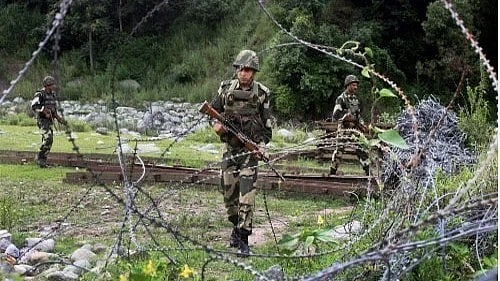
File photo showing Indian Army personnel patrolling the border regions in Jammu and Kashmir.
Credit: Reuters File Photo
In an unusual and sweeping move, the Jammu and Kashmir administration led by Lieutenant Governor Manoj Sinha last week banned 25 books—among them works by Booker Prize–winning author Arundhati Roy—accusing them of propagating a “false narrative and secessionism” in the Union Territory.
The list includes political commentaries and historical accounts such as The Kashmir Dispute 1947-2012 by India’s foremost constitutional expert A G Noorani, Kashmir at the Crossroads, and Contested Lands by Sumantra Bose.
The decision, issued by the Home Department, was swiftly followed by a police crackdown at bookshops across Srinagar and at the Chinar book festival, where around 200 stalls had been set up. Ironically, the nine-day book fair was inaugurated by the Lieutenant Governor.
Police said the “objective of the operation was to identify, seize, and forfeit any literature that propagates or systematically disseminates false narratives, promotes secessionist ideologies, or otherwise poses a threat to the sovereignty and unity of India.”
For writers, academics, and rights advocates, the decision has set off alarm bells. Many see it as further shrinking the already narrow civic space in the Valley. “Banning a book does not erase its ideas,” said a Srinagar-based historian who did
not wish to be named. “It simply drives the conversation underground and breeds more resentment.”
Globally, book bans have a chequered history. In societies attempting to resolve long and tangled historical disputes — from post-apartheid South Africa to post-conflict Northern Ireland — suppression of literature has rarely fostered lasting peace or reconciliation. More often, it has deepened mistrust between communities and the State. The urge to silence dissenting voices tends to confirm, rather than dispel, the perception that certain questions are too dangerous to ask.
The J&K administration’s approach also sits uneasily with its own stated objectives since the abrogation of Article 370 in August 2019. The Union government has repeatedly stressed that the region is on a path of accelerated economic development, improved infrastructure and greater integration into the national growth story. The pitch is that Kashmiris have a tangible stake in India’s rise, with new opportunities for jobs, education and investment.
However, economic gains alone cannot ease the political alienation that has festered for decades. Lasting peace in the Valley will require a deepening of democratic processes and genuine participation in governance --conditions that demand an atmosphere where multiple viewpoints, even sharp criticism of the state, can be expressed without fear.
By the government’s own account, the banned books represent a “narrative” it finds harmful. The surest way to counter a narrative is not to eliminate it but to offer a more persuasive, inclusive alternative rooted in people’s lived realities. A confident, democratic state should not fear the written word; it should welcome the contest of ideas as a sign of civic vitality.
Many of the proscribed works contain deeply personal accounts of loss, displacement and survival in the Valley. For their authors and readers, these are not abstract political tracts but testimonies -- flawed at times, painful often, and always shaped by personal experience. Such narratives form part of the social archive. Erasing them from shelves will not erase them from memory.
The government argues that it must guard against literature that could “incite” or “mislead” youth. But there is little evidence that banning books achieves this. In the digital age, scanned copies circulate quickly and quietly, often making titles more attractive precisely because they are forbidden.
In Kashmir, where the past is still a living, breathing presence, history cannot be wished away. Nor can it be flattened into a single authorised version. Peace,
if it is to endure, demands engagement with competing perspectives — even those that are uncomfortable or unsettling. The work of reconciliation is, at its core, the work of listening.
This is not to suggest that the state must uncritically endorse every claim made in such books. It has every right to challenge inaccuracies, contest interpretations and present its own evidence. But it should do so in open debate, not through prohibition. The marketplace of ideas, messy though it is, remains the most reliable safeguard against falsehood.
The ban comes at a time when the Valley’s political space is still constricted. Mainstream parties operate under heavy watch, separatist politics has been decimated by arrests and bans, and the media faces mounting legal and financial pressure. In such a climate, the removal of critical books adds another layer to what many describe as an “information squeeze”.
The government’s development narrative — new highways, better power supply, tourism push — can certainly be a source of optimism. But optimism grows strongest when it is matched by trust, and trust is built when citizens feel they can speak, write, and read freely without crossing invisible red lines.
If the aim is to counter secessionist thinking, the surest path lies in making the democratic union visibly fair, inclusive and responsive to the needs of every region. That means not just investment in infrastructure, but also a renewed federal spirit and a willingness to protect individual freedoms in the Valley.
The story of Kashmir’s future cannot be told by silencing parts of its past. It will be written — and rewritten — through dialogue, contestation and, above all, participation. That is the only durable antidote to any narrative the state may find troubling.